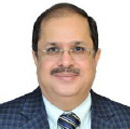
Dr. Ausaf Sayeed became Consul General of India, Chicago in August 2013. With nearly 25 years of diplomatic experience he has represented India’s interests and fostered relationships with nations around the world. He has served as Ambassador of India in Yemen (2010 – 2013), as Joint Secretary (West Africa) in the Ministry of External Affairs, New Delhi (2008 – 2010) and Consul General of India in Jeddah (2004 – 2008). He has also held various diplomatic assignments in Egypt, Saudi Arabia, Qatar and Denmark. Dr. Sayeed also launched several business groupings in the Gulf countries for promoting trade and economic relations with India. He holds a Master of Science and Ph.D. in Geology from Osmania University in Hyderabad, India.
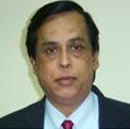
Prof. T. K. Chandrashekar is Secretary of the Science and Engineering Research Board (SERB), an independent statutory body of the Department of Science and Technology, India. SERB’s primary mandate is to support research in frontiers of science and engineering. Previously, he was Director at the National Institute of Science Education and Research (NISER). He is the recipient of S S Bhatnagar Prize, the J. C Bose Fellowship, and a Fellow of the Indian National Science Academy. His research interests are in bioinorganic chemistry, supramolecular chemistry and catalysis. He has published over 120 papers in reputed journals.
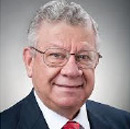
Prof. Bassam Shakhashiri is a noted chemistry and science educator. Best known for his leadership in national science policy and promoting excellence in science education at all levels, he has directed science policy at both the American Chemical Society and the National Science Foundation. Also known for his development and use of demonstrations in the teaching of chemistry, his multi-volume series, Chemical Demonstrations: A Handbook for Teachers of Chemistry, are models of learning and instruction. He is an advocate for policies to advance knowledge and to use science and technology to serve society.
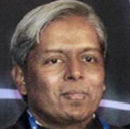
Prof. K. VijayRaghavan is the current Director of India’s Department of Biotechnology (DBT), which is responsible for administrating development and commercialization in the field of modern biology and biotechnology in India. Dr. VijayRaghavan was instrumental in creating the National Centre for Biological Sciences (NCBS) in Bangalore, one of India’s most prestigious scientific institutions, from the ground up. He wants to inject rigor into Indian science and train scientists to work together on tractable problems. Dr. Raghavan was trained as a chemical engineer and subsequently evolved into a fly geneticist and has authored several high-profile papers defining specific events in Drosophila muscle development.
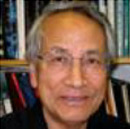
Prof. Uttam RajBhandary has made pioneering contributions in defining the role of transfer RNAs during protein synthesis. As a Colombo Plan Scholar, he studied at the University of Durham in England and received his Ph.D. in 1962. He then moved to the University of Wisconsin at Madison as a senior associate with Nobel laureate Professor Dr. HarGobind Khorana. In 1969, he moved to MIT as an Associate Professor and became a full Professor in 1975. At MIT, he was appointed Associate Head of the Department of Biology in 2004. He was elected a fellow of the American Academy of Arts and Sciences in 1991.
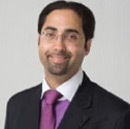
Dr. Nevan Hanumara helps manage the Tata Center for Technology and Design and is a Research Scientist at MIT’s Mechanical Engineering and Precision Engineering Research Group. Dr. Hanumara focuses on mechanical design and human factors and he works with clinicians and to develop medical device solutions to interventional challenges. He has hands-on prototyping, testing and project management expertise. Nevan has extensive experience teaching mechanical and medical device design and working internationally. He supports entrepreneurship as a mechanism for technology commercialization.
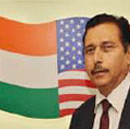
Dr. Rajiv Sharma is the current Executive Director of the Indo-US Science and Technology Forum (IUSSTF), an organization that promotes Indo-US bilateral collaborations in science, technology, and engineering through interaction among government, academia and industry. Starting with a Ph.D. in mathematics from IIT-Kanpur, his career includes more than 30 years of conceptualizing, implementing and monitoring programs in science & technology, mostly while at India’s Department of Science and Technology (DST) International Cooperation division, first as a Director and then as Advisor. In those roles, he built and managed the portfolio of bilateral science and technology cooperation programs with France, Israel, Japan and the United States, as well as with African and Nordic countries.
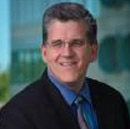
Dr. Stuart Ravnik is the Associate Dean, UT Southwestern Graduate School/Associate Dean Assistant Professor for Graduate School. His research has focused on the control of different aspects of the meiotic cell cycle and control of meiosis in general. Currently, his interests are in graduate education and training and scientific outreach to undergrads, high school students, and high school teachers. At the graduate level, he is involved in promoting scientific excellence and integrity, graduate student recruitment, and student affairs. In the undergraduate realm, his goals are to increase awareness of science as a career opportunity and help prepare undergrads for their graduate school careers.
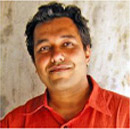
Prof. Aseem Z. Ansari is the founder of the Khorana and S. N. Bose Programs and the chairman of WInstep Forward, a non-profit that implements the two programs in close cooperation with IUSSTF, governmental (SERB, DBT, NSF) and academic partners in India and the US. He is also a professor chemical genomics and synthetic biology at the University of Wisconsin-Madison and Genome Center of Wisconsin. Dr. Ansari’s introduction to science began by reading scientific articles by Professor Khorana and working as an undergraduate in the laboratory of Professor Obaid Siddiqi at the Tata Institute of Fundamental Research (TIFR). Subsequently as a fellow at MIT/Harvard he met Dr. Khorana and working with Dean Kenneth Shapiro founded the Indo-US exchange program in Dr. Khorana’s honor in 2007 at UW-Madison. The S. N. Bose program was launched in 2013.